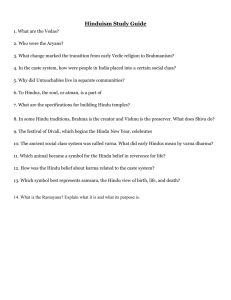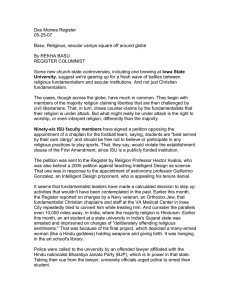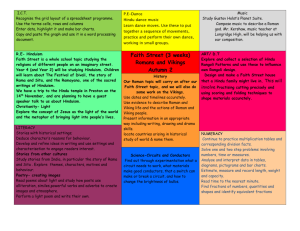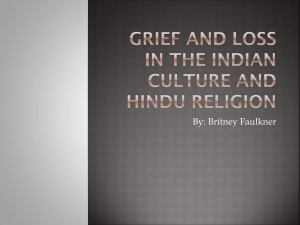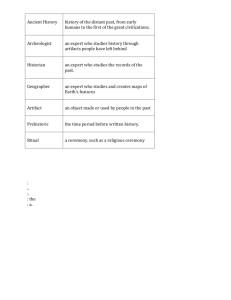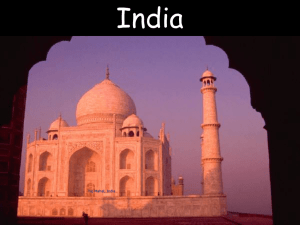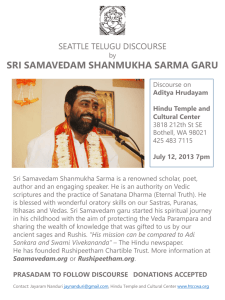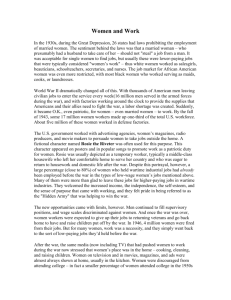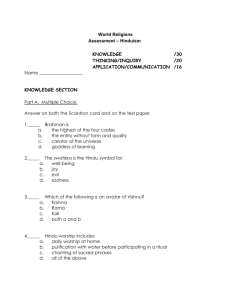An inter-faith marriage
advertisement
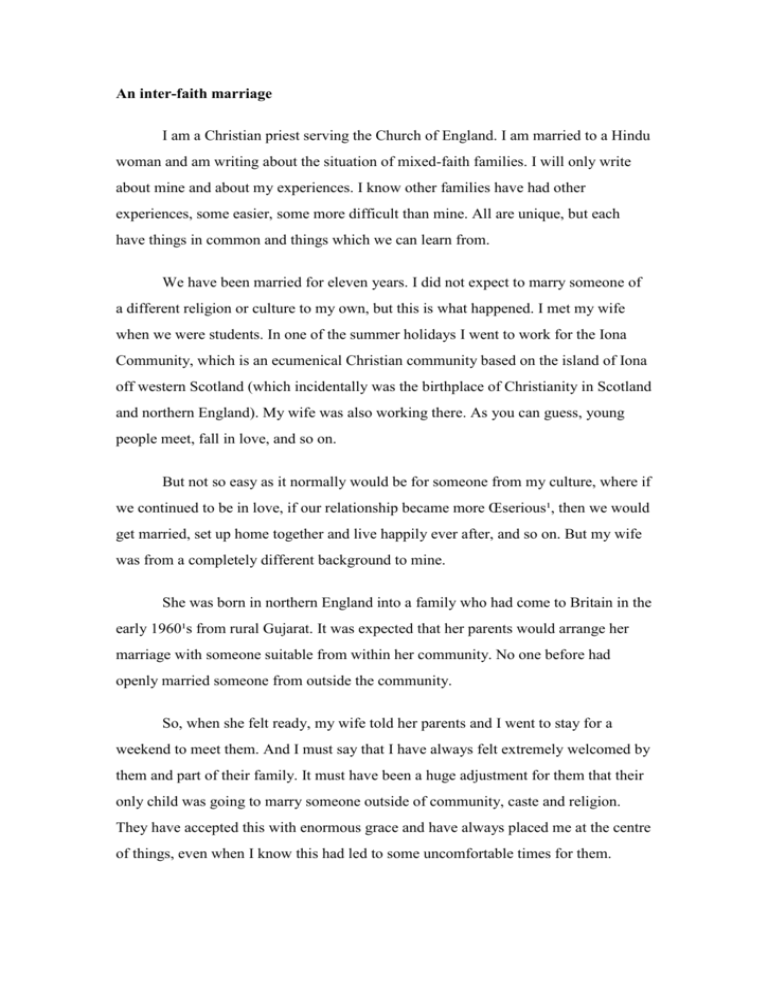
An inter-faith marriage I am a Christian priest serving the Church of England. I am married to a Hindu woman and am writing about the situation of mixed-faith families. I will only write about mine and about my experiences. I know other families have had other experiences, some easier, some more difficult than mine. All are unique, but each have things in common and things which we can learn from. We have been married for eleven years. I did not expect to marry someone of a different religion or culture to my own, but this is what happened. I met my wife when we were students. In one of the summer holidays I went to work for the Iona Community, which is an ecumenical Christian community based on the island of Iona off western Scotland (which incidentally was the birthplace of Christianity in Scotland and northern England). My wife was also working there. As you can guess, young people meet, fall in love, and so on. But not so easy as it normally would be for someone from my culture, where if we continued to be in love, if our relationship became more Œserious¹, then we would get married, set up home together and live happily ever after, and so on. But my wife was from a completely different background to mine. She was born in northern England into a family who had come to Britain in the early 1960¹s from rural Gujarat. It was expected that her parents would arrange her marriage with someone suitable from within her community. No one before had openly married someone from outside the community. So, when she felt ready, my wife told her parents and I went to stay for a weekend to meet them. And I must say that I have always felt extremely welcomed by them and part of their family. It must have been a huge adjustment for them that their only child was going to marry someone outside of community, caste and religion. They have accepted this with enormous grace and have always placed me at the centre of things, even when I know this had led to some uncomfortable times for them. And we were married. We thought hard about the best way to do this and came to the conclusion that we wanted to reflect and honour both our religious traditions fully, so we were married twice. First in a Church where my family live, and then three weeks later in the Hindu Temple. The Christian wedding was a normal size for Christian weddings with about ninety people there (which was capacity for the small medieval church in which the ceremony took place). This included a coach full of my wife¹s family who came to share in the occasion. An anglican marriage ceremony in this country and culture usually takes a little less than an hour, with the couple making vows to each other before God and the community, with Bible readings and a sermon, prayers, and legal formalities. The rest of the day is taken up with a meal, speeches and toasts by close family and friends, before the couple go off together for a holiday. Three weeks later, we were married again in a Hindu ceremony. This was a much bigger affair with 350 guests (although this was by no means a large number). As you can imagine, there was a great deal of interest in this wedding. For me, the main difference between the ceremonies went beyond ritual, custom or language, for it was the binding together of two families for several generations in the Hindu ceremony. Christian understanding, it is the joining of two individuals until ³till death us do part². Reflecting on this, I am not sure what this difference means, but I do know that there is a profound joining between us. So the weddings were on the whole positive experiences, although I know that my wife felt under a lot of pressure at the Hindu ceremony and that people had come to see this person marrying out of community. I was impressed by her father. It would have been easy for him to have made sure that the ceremony was hidden and private, and I think there may have been some pressure for him to do this. He declared that he had nothing to be ashamed about. This was the first wedding like this in that particular community. But this shows us some clear things about the nature of different faith and cultural communities in this country as they have come into being through the immigration of the last forty years and as they have begun to coexist, mix and change and mature. History and common sense show us that it is inevitable in such situations that individuals from different communities will meet, love and marry. This is a challenge as well as a blessing to the different communities, and it is something that we have to continue working on corporately. I would say that marriages such as mine have a great deal to offer society. Perhaps they offer a kind of icon of the future for rainbow cities and communities such as those from which we all come. If we cannot live together, work together, love together, then what is the future for us? Living together in an open way is bound to take us to places we do not expect, and while this is painful, it is also part of the fun and it has integrity. Following the philosophical theory that the personal is the political, we can see the importance of mixed faith marriages in a world where 9/11 happened or in which fascist councillors have recently been elected in parts of Britain. There is a clear political dimension here and a vulnerability. The visibility and newness of such marriages adds extra pressures to them. I would ask society and all the faith communities about what they can do to support them. They clearly offer a challenge to those religious people and forces who would like to make everyone in the world the same as they are. I know Christian people who are concerned and scandalized because of my marriage. This is magnified and given focus because I am a priest and have a public and leadership role within the Church. I should say that at no time during the lengthy procedure of selection and formation for me to become an anglican priest, did it become apparent that it was a problem or a stumbling block for me to be married to someone of another faith (although people did speak to me truthfully about the pain that this might involve). I think there is not time to go deeply into the field of evangelism, conversion and so forth, and it is one that I know generates a great deal of emotion and passion. I guess the questions I would want to pose here from my background and experience are to do with how and what God might be up to in relationships such as mine (and for Christians bearing in mind that God is love and those who live in love, live in God), and also to ask about community building and regeneration in the society and world in which we live, and what God is asking of us in this context. We have one child and are doing our best to bring her up in the integrity of both traditions. We felt that the Hindu and Indian parts of her would be most vulnerable to being lost, so she has a traditional and ancient Hindu name. We are planning her first trip to India after Christmas, which will of course include time spent with her great grandmother in the village. I suppose it is inevitable that she goes to Church more than Temple, but at a Hindu wedding she went to last Sunday, she was asked if she was Christian or Hindu, and she answered that she was both. This makes me very proud. If she wants to choose in the future, she can, but we are trying to give her a proper grounding in both. She offers a future, a challenge and a blessing to this country and its faith communities.
